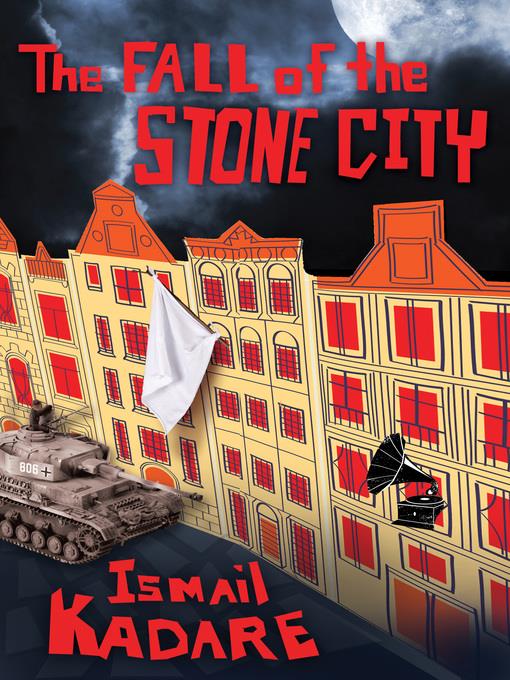
The Fall of the Stone City
- اطلاعات
- نقد و بررسی
- دیدگاه کاربران
نقد و بررسی

October 29, 2012
In his latest novel, Kadare (The Ghost Rider) features many of his motifs—bloody Balkan histories; bleak totalitarianism lives under silky threads of magical realism—that have made him a perpetual shortlister for Noble Prize laureate. This novel, set in the isolated Albanian city of Gjirokastër, covers roughly 10 tumultuous years, encompassing the Italian withdrawal and subsequent German invasion during WWII. Always aware of this historical backdrop, Kadare considers its impact on private lives. The mystery preoccupying both the city and novel centers around events of September 16, 1943, a night when “Big Dr Gurameto” hosted a dinner for Col. Fritz von Schwabe, commander of the first German division to enter Albania and old friend of Gurameto’s from their college days. That party, resulting in the unexpected release of hostages held by the Germans, remains shrouded in inscrutability until Gurameto is made to account for his actions when the country’s new Communist leaders force a reckoning after the war. The answer doesn’t explain the circumstances of September 16 so much as shine a light on the impossibilities of negotiating the relentless press of history. A thoughtful exploration of the colluding forces of fascism and communism and a country caught between them that is at once obscure and enigmatic, lucid and insistent.

November 15, 2012
An ironic, sober critique of the way totalitarianism rewrites history, from an Albanian author who's long been the subject of Nobel whispers. The novel opens in 1943, as the Nazis are poised to move into Albania, retaking the country from Italy and invading the city of Gjirokaster. The locals are understandably restless, and an advance party is fired upon. Hostages are taken, and bloodshed seems inevitable. But in an effort to calm tensions, a leading doctor, Gurameto, meets with the Nazi commanding officer, Col. Fritz von Schwabe, who also happens to be an old college classmate. The loose plot of Kadare's novel (The Accident, 2010, etc.) turns on the question of what exactly happened at that meeting. Various theories circulate among the citizenry: the invasion was all about locating and handing over a prominent Jew, Gurameto was angling for a governorship, the Albanians were being punished for their own incursions into Greece, and so on. Through these stories, Kadare explores the way people project their own nationalistic anxieties and prejudices onto every situation; the lyrics of a local bard turn the events into a kind of folklore. Kadare's omniscient view emphasizes political processes at the expense of characterization, but if we don't get to know the doctor, the colonel or the residents very well, Kadare is still a potent storyteller, and as the story jumps to 1944 and then to 1953, he reveals the grim consequences of dictatorships on identity. The tail end of the novel focuses on Stalinist interrogators' efforts to bully and torture the truth about the meeting out of Gurameto, and his refusals don't symbolize heroism so much as resignation--a realization that the facts will never be clear in the face of anti-democratic thuggery. A harsh but artful study of power, truth and personal integrity.
COPYRIGHT(2012) Kirkus Reviews, ALL RIGHTS RESERVED.

Starred review from December 1, 2012
Traitor or hero? The people of Gjirokast'r endlessly debate the role of Dr. Gurameto in hosting a regal dinner for the commander of the Nazi army invading their ancient Albanian city. Some regard the German-schooled gynecologist as a quisling who welcomed an enemy; others view him as a brave tactician who saved scores of hostagesincluding a notable Jewfrom death camps. Kadare's mesmerizing novel allows readers to see how conflicting rumors about the dinner complicate the competitive relationship between Dr. GurametoBig Dr. Gurametoand his Italian-trained rival and doppelgnger, the little Dr. Gurameto, and then how these rumors acquire new virulence under the Communists who replace the Nazis as Albania's rulers. Commissioned to investigate the matter, one Shaqo Mezini interrogates Big Dr. Gurameto with a zeal incubated in his own paranoid fantasies about international medical conspiracies against Stalin. The interrogation veers further into the surreal as doubts surface as to the identity of the mysterious German colonel Dr. Gurameto feted with champagne and Schubert. As memorable as Dostoyevsky's Porfiry and Orwell's O'Brien, Mezini ruthlessly tears an opening into Dr. Gurameto's turbulent mind, loosing a flood of dark secrets rooted in childhood anxieties and sepulchral nightmares. A well-crafted translation of a European masterpiece.(Reprinted with permission of Booklist, copyright 2012, American Library Association.)




دیدگاه کاربران